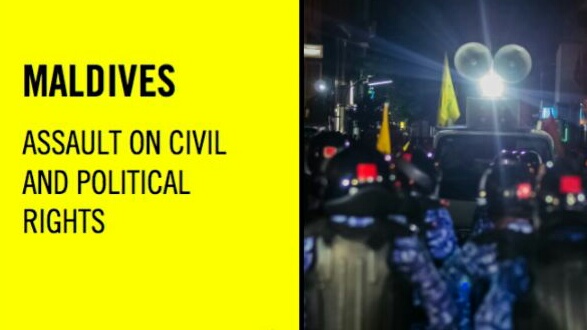The human rights situation in the Maldives is “rapidly deteriorating” with the government cracking down on peaceful protests, stifling dissent, and imprisoning opposition politicians, Amnesty International has said.
A delegation from the international human rights organisation conducted a fact-finding mission in the Maldives from April 17 to 22 and released a briefing report titled ‘Assault on civil and political rights’ today.
“There’s a climate of fear spreading in the Maldives, as safeguards on human rights are increasingly eroded. The authorities have a growing track record of silencing critical voices by any means necessary – be it through the police, the judicial system, or outright threats and harassment. This must end immediately,” said Abbas Faiz, Amnesty International’s Maldives researcher, after launching the briefing at a press conference in New Delhi, India.
“The international community must wake up and realise that behind the façade of a tourist paradise, there is a dark trend in the Maldives where the human rights situation is rapidly deteriorating.”
Raghu Menon, Amnesty International India’s advocacy coordinator, who was part of the fact-finding mission, said India as a regional power “has a responsibility to work towards a human rights-friendly environment in the Maldives.”
The delegation also sought meetings with government officials this week, but were offered meetings in May.
President’s office spokesperson Ibrahim Muaz Ali told Minivan News today that he did not wish to comment on the report.
“The government has invited various international organisations. So they will come and reveal [information about] their work. The government does not have to respond to each report. The government will take the initiative and respond in cases where it believes it has to,” he said.
The delegation also requested a visit to the Dhoonidhoo detention centre to meet former president Mohamed Nasheed and other detainees, but the foreign ministry offered to facilitate a visit in May.
Faiz meanwhile called on the government to “immediately end its disturbing crackdown on human rights.”
“Political tensions are already at a boiling point, and further harassment and attacks on those opposing the authorities will only make the situation spiral out of control,” he warned.
“The international community cannot turn a blind eye to what is happening in the Maldives. The upcoming UN [Universal Period Review] session in Geneva in May is a key moment to push the Maldives authorities to immediately take concrete action to improve the country’s human rights situation.”
Crackdown
Amnesty said the government was “abusing the judicial system” to imprison political opponents, including opposition leader Nasheed, ex-defence minister Mohamed Nazim, and former ruling party MP Ahmed Nazim.
“Mohamed Nasheed’s imprisonment came after a sham trial, but he is far from the only one locked up on trumped-up charges and after unfair trials. It is disturbing how far the Maldives government has co-opted the judiciary as a tool to cement its own hold on power,” said Faiz.
Amnesty also noted that at least 140 people have been arrested from opposition protests since February, with the court releasing several protesters on the condition that they do not attend protests for 30 to 60 days.
The opposition, human rights NGOS, and the prosecutor general have said the condition is unconstitutional as freedom of assembly is a fundamental right.
“Additionally, police have imposed far-ranging restrictions on where and when protests in the Maldives capital Male can take place,” Amnesty said.
“Demonstrations are only allowed in certain areas far away from official buildings, contrary to international law and standards.”
The briefing also noted increasing threats and attacks against journalists, civil society organisations, and human rights defenders, adding that police have not “meaningfully” investigated threatening text messages or phone calls.
Amnesty said that “vigilante religious groups allegedly in cahoots with the police have in recent years stepped up kidnappings and attacks on social gatherings, in particular against those accused of promoting ‘atheism.'”
“This year, such gangs have in connivance with police attacked peaceful demonstrators, yet no one has been brought to justice for these attacks.”
The briefing also noted that the Supreme Court last year charged the Human Rights Commission of the Maldives (HRCM) with “high treason and undermining the constitution” following the state watchdog’s submission on the state of human rights in the Maldives to the UPR.
Meanwhile, in an op-ed published on The New York Times this week, Mariyam Shiuna, executive director of local NGO Transparency Maldives, observed that “political persecution has intensified, civil society is silenced and media intimidation has become the norm.”
“The international community needs to put pressure on the government to halt its crackdown on opponents and dissidents from all parts of the political sphere. Without basic freedoms and space for dissent the Maldives is slipping back to the dark days of dictatorship,” she wrote.







It is report after report we are seeing!
President Nasheed once again is behind bars for who he is and what he stands for!
And this Amnesty has the guts to bring out report after report year after year after the 2012 February 7th coup!
Who are they fooling? Themselves! Certainly not the people of Maldives!
It is bloody 3 years since the coup of February 7th 2012 and all Amnesty could do was ceremonious reporting!
Thanks Amnesty! Do your best reporting next year and the ones that follow the next!